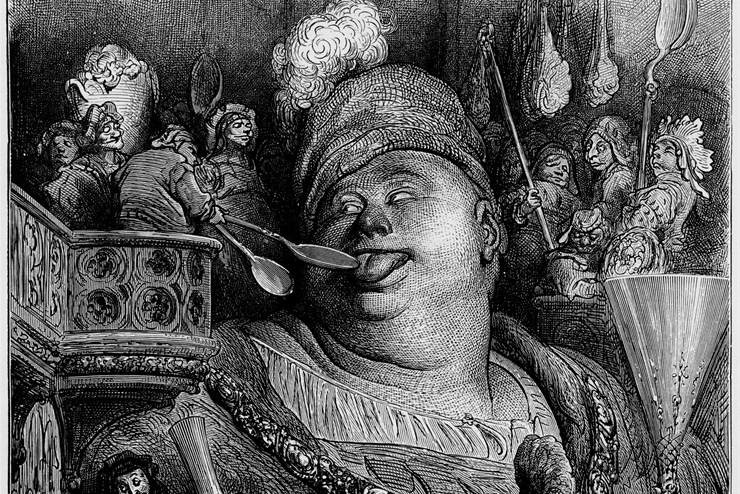It is significant but not surprising that Ross Douthat in his book The Decadent Society and reviewer John M. DeJak (“A Decadent Diagnosis,” August 2020 Chronicles) both overlooked the pivotal impact of Vatican II and Catholic social doctrine.
These two liberal landmarks changed the religious and cultural focus from duty to freedom; from truth to inclusiveness; from repentance to rationalization; from gratitude to entitlement; from hierarchy to equality; from objective morality to subjective morality; from capitalism to socialism; from religion to politics; from God-given rights to manufactured rights; and from traditional Catholicism to the false religion of social justice.
As I see it, the only way out of this doomsday scenario is a renaissance of traditional Catholicism. Currently, what is most needed is an ongoing exposé of Vatican II and Catholic social doctrine as seed beds of disunity, heresy, confusion, and decadence.
—George J. Koenig
St. Francis, Wis.
Mr. DeJak Replies:
The task of the reviewer is to observe, laud, critique, condemn, lament, discourage, or recommend the book he is considering within certain space constraints. Given such limitations, one must be selective in what he chooses to address. Mr. Koenig’s letter seems to imply that the Second Vatican Council is some sort of “third rail” that cannot be touched or critically questioned lest one’s bona fides as a faithful Catholic come into question.
I cannot speak for why Mr. Douthat did not spend more time on the council. I will point out that I’ve addressed this subject in these pages in my review of Bishop Athanasius Schneider’s book Christus Vincit (“Books in Brief,” January 2020 Chronicles), where I extolled his public critique of the troubling aspects of Vatican II.
Happily, critiques of the council have come from many different corners as of late, including from Archbishop Carlo Maria Viganò, Prof. Janet Smith, and even from Pope Emeritus Benedict XVI.
The other locus of Mr. Koenig’s concern is the Church’s social doctrine. I surmise and would agree with Mr. Koenig’s critical posture towards a sort of Ostpolitik with alien and contradictory philosophies and social movements in the post-Conciliar era. Indeed, this has created much mischief, especially when linked to the so-called “spirit of Vatican II.” I agree with Mr. Koenig that this is a spirit that must be exorcised. Likewise, the dictum of sentire cum Ecclesia (“thinking with the Church”) means thinking with the entire 2,000-year tradition of the Church, which Mr. Koenig rightly recommends.
Reasonable minds can differ on Mr. Douthat’s decision to give short shrift to the Council and modern Catholic social doctrine as watershed religious events that have sunk us deeper into cultural and spiritual decadence, or on the duty of the book reviewer to correct that parsimony.
Rebellion to Tyrants
In Prof. Mark David Hall’s excellent article on the contributions that the Pilgrims and Puritans in New England made to our basic perception of civil and religious liberties (“The 1620 Project,” September 2020 Chronicles), I was surprised by his omission of the famous sentence prominently displayed inside the entrance to Thomas Jefferson’s home at Monticello: “Rebellion to tyrants is obedience to God.” This was one of the watchwords of the Puritans during the English Civil War in the 1640s. I cannot think of a better example of the influence of our Calvinist forebears on one of our most prominent Founding Fathers.
—John K. Dirlam
Wellesley, Mass.
Nullification Notification
Prof. Mendenhall’s article on Learned Hand (“Remembering Learned Hand,” September 2020 Chronicles) caught my attention. My maternal grandmother’s name was Lena Hand and she was a first cousin of Learned Hand. I remembered hearing a lot about the well-known jurist in our family.…
My purpose in writing this is to alert people to one of our essential rights we have under the Sixth Amendment to the United States Constitution. When we sit on the impartial juries described [in the Sixth Amendment] we have the power not only to determine the facts in the case but also to determine whether the law that the judge has proclaimed the accused to have violated can be considered fair and just.
In contemporary jargon, we have a right to engage in jury nullification. The juries mentioned in the Declaration of Independence engaged in this right routinely and the juries mentioned in the Sixth Amendment still have this right. Over the decades, the legal profession has tried to hide this right from us by the unconstitutional jury instructions that it has judges proclaim to jurors.
—Dr. W. David Herbert
Billings, Mont.
Image Credit:
above: Gargantua at table, illustration by Gustave Doré from Gargantua and Pantagruel by François Rabelais (public domain)

Leave a Reply